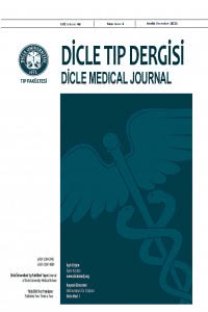Investigation of the Relationship between Emotional Intelligence and Quality of Life, and Depression, Anxiety, and Stress in Patients with Osteoarthritis
Investigation of the Relationship between Emotional Intelligence and Quality of Life, and Depression, Anxiety, and Stress in Patients with Osteoarthritis
Emotional Intelligence Mood, Quality of life,
___
- 1. Woolf AD, Pfleger B. Burden of major musculoskeletal conditions. Bull World Health Organ. 2003; 81: 646-56.
- 2. Umay E, Rükşen S, Tezelli MK, et al.Evaluation of patient satisfaction from the short term outcomes of balneotherapy and physical therapy in musculoskeletal disorders. Turk J Phys Med Rehab. 2013; 59: 222-8.
- 3. Weng MC, Lee CL, Chen CH, et al. Effects of different stretching techniques on the outcomes of isokinetic exercise in patients with knee osteoarthritis. Kaohsiung J Med Sci. 2009; 25: 306-15.
- 4. Zhang W, Moskowitz R, Nuki G, et al. OARSI recommendations for the management of hip and knee osteoarthritis, Part II: OARSI evidence-based, expert consensus guidelines. Osteoarthritis Cartilage. 2008; 16: 137-62.
- 5. Condon SE, Parmelee PA, Smith DM. Examining emotional intelligence in older adults with chronic pain: a factor analysis approach. Aging Ment Health. 2021; 25: 213-8.
- 6. Schmidt JE, Andrykowski MA. The role of social and dispositional variables associated with emotional processing in adjustment to breast cancer: an internet based study. Health Psychol. 2004; 23: 259-66.
- 7. Rey L, Extremera N, Trillo L. Exploring the relationship between emotional intelligence and health-related quality of life in patients with cancer. J PsychosocOncol. 2013; 31: 51-64.
- 8. Goleman D. Emotional intelligence: Why it can matter more than IQ. Bantam; 2012.
- 9. Yılmaz M. Nephrology nursing and emotional intelligence. J NephrolNurs. 2015; 10: 13-8.
- 10. Şahin NH, Güler M, Basım HN. The Relationship between Cognitive Intelligence, Emotional Intelligence, Coping and Stress Symptoms in the context of Type A Personality Patern. Turk PsikiyatriDerg. 2009; 20: 243-54.
- 11. Ebrahimi L, Masoumi M, Hojjati AH, et al. Comparing the quality of life and emotional intelligence among patients with psychosomatic disease (Type 2 Diabetes) and healthy individuals.Neuroquantology. 2017; 15: 12-9.
- 12. Shahnavazi M, Parsa-Yekta Z, Yekaninejad MS, et al. The effect of the emotional intelligence education programme on quality of life in haemodialysis patients. ApplNurs Res. 2018; 39: 18-25.
- 13. Baudry AS, Anota A, Mariette C, et al. The role of trait emotional intelligence in quality of life, anxiety and depression symptoms after surgery for esophageal or gastric cancer: A French national database FREGAT. Psychooncology. 2019; 28: 799-806.
- 14. Amirifard N, Payandeh M, Aeinfar M, et al. A survey on the relationship between emotional intelligence and level of depression and anxiety among women with breast cancer. Int J HematolOncol Stem Cell Res. 2017; 11: 54-7.
- 15. Tillmann T, Krishnadas R, Cavanagh J, et al. Possible rheumatoid arthritis subtypes in terms of rheumatoid factor, depression, diagnostic delay and emotional expression: an exploratory case-control study. Arthritis Res Ther. 2013; 15: 1-11.
- 16. Faul F, Erdfelder E, Lang AG, et al.G* Power 3: A flexible statistical power analysis program for the social, behavioral, and biomedical sciences. Behav Res Methods. 2007; 39: 175-91.
- 17. Petrides KV, Furnham A. Trait emotional intelligence: Psychometric investigation with reference to established trait taxonomies. Eur J Pers. 2001; 15: 425-48.
- 18. Deniz ME, Özer E, Işık E. Emotional intelligence trait scale–short form: validity and reliability study. Educ and Sci. 2013; 38: 407-19.
- 19. Yağcan H, Uludağ E, Okumuş H. The Comparison of Nursing Students’ Emotional Intelligence and Professional Values. DEUHFED. 2021; 14: 224-31.
- 20. Kocyigit H. Reliability and validity of the Turkish version of Short Form-36. Turk J Drugs Ther. 1999; 12: 102-6.
- 21. Akın A, Çetin B. The Depression Anxiety and Stress Scale (DASS): The study of Validity and Reliability. Educ Sci. 2007; 7:260-8
- 22. Lovibond PF, Lovibond SH. The structure of negative emotional states: Comparison of the Depression Anxiety Stress Scales (DASS) with the Beck Depression and Anxiety Inventories.Behav Res Ther. 1995; 33: 335-43.
- 23. Hayran M, Hayran M. Basic Statistics for Health Research (1st Edition). Art Ofset Printing Publishing Organization (Ankara) 2011; 95: 468-74.
- 24. Schutte NS, Malouff JM, Thorsteinsson EB, et al. A meta-analytic investigation of the relationship between emotional intelligence and health. Pers Individ Dif. 2007; 42: 921-33.
- 25. Yalcin BM, Karahan TF, Ozcelik M, et al. The effects of an emotional intelligence program on the quality of life and well-being of patients with type 2 diabetes mellitus. Diabetes Educ. 2008; 34: 1013-24.
- 26. Smith SG, Petrides K, Green JS, et al. The role of trait emotional intelligence in the diagnostic cancer pathway. Support Care Cancer. 2012; 20: 2933-9.
- 27. Kousha M, Bagheri HA, Heydarzadeh A. Emotional intelligence and anxiety, stress, and depression in Iranian resident physicians. J Family Med Prim Care. 2018; 7: 420-4.
- ISSN: 1300-2945
- Yayın Aralığı: 4
- Başlangıç: 1963
- Yayıncı: Cahfer GÜLOĞLU
Çocuklarda Meckel Divertikülünün Farklı Klinik Semptomları ve Cerrahi Tedavisi
Osman Hakan KOCAMAN, Tansel GÜNENDİ
Münevver BARAN, Nazmiye BİTGEN, Kübra Tuğçe KALKAN, Özge GÖKTEPE, Salih VAROL, Arzu YAY
Rekürren İskemik İnme / Geçici İskemik Atak ile Atriyal Fibrilasyon İlişkisi
Impact of the COVID-19 Pandemic on Anxiety and Depression Levels in Pregnant Women
Gokce TURAN, Mehmet Zeki TANER, Ayla ESER, Ayse Duygu TUFAN, Cem TERECE, Hasan Huseyin UCKAN, Tuncay NAS
Muhammed DEMİR, Mehmet ÖZBEK, Adem AKTAN, Tuncay GÜZEL, Burhan ASLAN, Hakkı ŞİMŞEK
Kardiyolojide Yeni Nesil Dizileme Uygulamaları
Elif MANĞAL, Gonca KARAKUŞ, Lut TAMAM, Zeynep NAMLI, Mehmet Emin DEMİRKOL, Perihan ÇAM RAY
